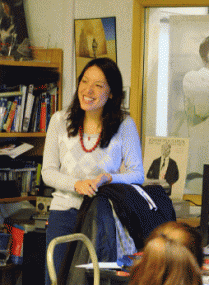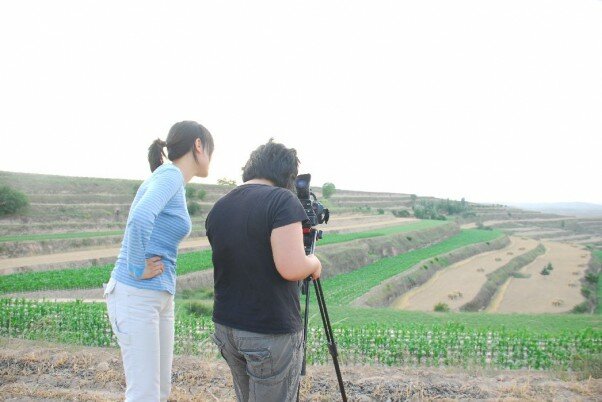We caught up with Carol Liu, who gave us a great show back in December here in Beijing. She answered questions about her experience filming a documentary in China, and some of the stories behind the main characters in her film.
James Flanagan/Asia Healthcare Blog: What motivated you to make “Restoring the Light”?
Carol Liu: Growing up, I came to China a lot, starting in the late 1980s. Each time I returned to the US, I’d experience a disconnect between the China I knew and the China I saw depicted on American TV.
Now, news about China’s economic miracle and even ‘threat’ regularly appears on US airwaves and television screens —still, I think the magnitude of China’s challenges continues to be misunderstood.
So, after finishing my film studies at NYU, I began “Restoring the Light” because I thought film could help give voice to the people of rural China, who numbered about 700 million people, roughly 60% of the entire country when I began the project. Their challenges are not well understood even by fellow Chinese living in more affluent coastal and urban areas, much less the average American. The rate of constant change has been so great, that we have an entire generation of urban Chinese youth who are themselves out of touch with the growing disparities separating their lives from the lives of people in the country.
I’ve sought to portray the incredible resilience of the subjects in the film — Dr. Zhang Xubin, an eye doctor, two of his patients and their families — all from Ningxia, but the film really could have been set in any poor household in rural China. I want to show how they face each day with hope and immense courage despite their circumstances. I want to shine a light on the humanity we share in common with those whose lives are so often summarized into a statistic. And I hope people watching the film around the world and in China will be encouraged and inspired, to look beyond national boundaries and socio-economic differences to get involved in social good.
JF: How long did it take to make the film?
CL: I began “Restoring the Light” in 2008 and am still raising funds for the last of the film’s finishing and to support our outreach campaign. We are currently seeking sponsorships and donations.
JF: How did you find the doctor and the families profiled in the film?
 CL: I went on research trips to remote regions of Ningxia province to find them. I spent most of my time in the impoverished south. I heard about Dr. Zhang Xubin’s work with his charitable mobile eye clinic. Dr. Zhang had given up lucrative big city prospects to return to the countryside to run his mobile clinic and independent practice, which he sold his home to finance — much to the heartache of his wife and family.
CL: I went on research trips to remote regions of Ningxia province to find them. I spent most of my time in the impoverished south. I heard about Dr. Zhang Xubin’s work with his charitable mobile eye clinic. Dr. Zhang had given up lucrative big city prospects to return to the countryside to run his mobile clinic and independent practice, which he sold his home to finance — much to the heartache of his wife and family.
In one village, I met Grandma Yuan, a tiny lady with bound feet and worsening cataracts, hard at work in the fields. Her single-minded devotion to her granddaughter Rongrong really struck me. Rongrong wanted to go to university and study art, despite a debilitating bone disease. If accepted, she’d be one of very few from the entire region. And this was going to be her only chance at a better life. You could see how her entire family was focused on trying to make this fragile hope a reality.
I found the young boy, Li Juncheng, and his sister Caixia very much by chance as I passed by their house while visiting another family. Juncheng was by the gate, the way you see him in the opening sequence of the film. I could see his eyes were impaired, and yet, he was so full of joy, like any young boy. He told me he wanted to be a truck driver. The moment I met him, I knew he had to be in the film. I wanted to follow his journey.
JF: Was it difficult to work with Chinese government? Did you have problems with censorship or being allowed to shoot?
CL: I had the help of some good people at the China Foundation for Disabled Persons, so I was able to access remote areas of Ningxia, which is one of China’s poorest provinces. They allowed me to film in places still totally closed off to foreign visitors, and still have the creative space I wanted for the tone of the film and its subjects. It may not work for every film but it managed to work for us.
JF: Do you have any advice for other filmmakers looking to shoot in China?
CL: China has a wealth of stories to offer the world. I hope more filmmakers come to China to uncover all the different facets of this complex nation and to do so with empathy and understanding. For various reasons, sensational stories tend to dominate Western media and they do a great disservice to the developing dialogue between China and the rest of the world.
JF: Where can people see the film?
CL: Please sign up for our mailing list at www.restoringthelight.com or email us at info[at]restoringthelight.com. Our next event is happening at the US Embassy. We’ll continue to screen locally in China, the US, and internationally in 2012 at film festivals and specialized presentations to schools, universities and local community groups.
We’ve also had interest from companies and organizations who would like to take on the film for internal training and public awareness campaigns to frame their existing initiatives in informing the world about China, rural healthcare, education, disability issues, poverty alleviation, etc. Please get in touch; we hope to tailor screenings, distribution and educational events to reach more audiences.
JF: If people want to help, what can they do?
CL: There are many things they can do:
- Raise public awareness by requesting a screening or by becoming a distribution/outreach partner (this includes NGOs, companies, and institutions).
- Become a financial sponsor of the film so we can keep our outreach events relevant and free.
- Volunteer: we seek technical support to chronicle the film’s impact and advocacy efforts in China and around the world.
- Share their reactions to the movie as the blogger Joyce Ho did (via Twitter/Facebook/Weibo, etc.)
- Support our partner organizations and get involved!
Please email me carol[at]restoringthelight.com if you would like to get involved, and visit our website: www.restoringthelight.com.
JF: What kind of impact have you been having with the screenings of the film?
CL: It’s been humbling to see people’s emotional response to the film and then try to channel that towards community action. We are bringing together doctors, scientists, multinational corporations, academics, students, NGOs, development agencies, policymakers and the film-going public at our various outreach events. As a filmmaker, I can’t provide the answers to the systemic problems profiled in the film, but by providing a platform to open the conversation, encourage collaboration and the sharing of resources, I’m confident that solutions can begin to be formulated.

